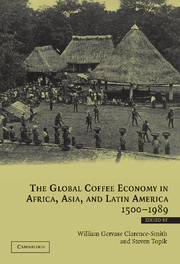Book contents
- Frontmatter
- Contents
- World coffee production
- Guatemala and Mexico
- Nicaragua and Costa Rica
- Brazil
- Cameroon
- Madagascar and Réunion
- East Africa
- Red Sea
- Ceylon and South India
- Java
- Introduction: Coffee and Global Development
- I ORIGINS OF THE WORLD COFFEE ECONOMY
- 1 The Integration of the World Coffee Market
- 2 Coffee in the Red Sea Area from the Sixteenth to the Nineteenth Century
- 3 The Origins and Development of Coffee Production in Réunion and Madagascar, 1711–1972
- 4 The Coffee Crisis in Asia, Africa, and the Pacific, 1870–1914
- 5 The Historical Construction of Quality and Competitiveness: A Preliminary Discussion of Coffee Commodity Chains
- II PEASANTS: RACE, GENDER, AND PROPERTY
- III COFFEE, POLITICS, AND STATE BUILDING
- Conclusion: New Propositions and a Research Agenda
- Appendix: Historical Statistics of Coffee Production and Trade from 1700 to 1960
- Index
3 - The Origins and Development of Coffee Production in Réunion and Madagascar, 1711–1972
Published online by Cambridge University Press: 01 September 2009
- Frontmatter
- Contents
- World coffee production
- Guatemala and Mexico
- Nicaragua and Costa Rica
- Brazil
- Cameroon
- Madagascar and Réunion
- East Africa
- Red Sea
- Ceylon and South India
- Java
- Introduction: Coffee and Global Development
- I ORIGINS OF THE WORLD COFFEE ECONOMY
- 1 The Integration of the World Coffee Market
- 2 Coffee in the Red Sea Area from the Sixteenth to the Nineteenth Century
- 3 The Origins and Development of Coffee Production in Réunion and Madagascar, 1711–1972
- 4 The Coffee Crisis in Asia, Africa, and the Pacific, 1870–1914
- 5 The Historical Construction of Quality and Competitiveness: A Preliminary Discussion of Coffee Commodity Chains
- II PEASANTS: RACE, GENDER, AND PROPERTY
- III COFFEE, POLITICS, AND STATE BUILDING
- Conclusion: New Propositions and a Research Agenda
- Appendix: Historical Statistics of Coffee Production and Trade from 1700 to 1960
- Index
Summary
Introduction
Coffee production on Réunion (Bourbon), a small island near Madagascar off the coast of Africa, was significant in the eighteenth century, but declined rapidly thereafter. Réunion Creoles then carried the coffee frontier to Madagascar, conquered by France in 1895. Colonial policies made coffee the major Malagasy export by the 1930s and, inadvertently, promoted indigenous smallholder production. The subsequent battle over resources between Réunion Creoles and their Malagasy competitors on the East Coast was a major cause of the 1947 uprising, one of the most bloody episodes in French colonial history. The revolt effectively squeezed small Creole planters out of coffee, leaving a handful of large metropolitan French concerns and numerous small indigenous cultivators. The 1972 revolution led to the demise of large French companies and ushered in a period of mismanaged nationalization that undermined the entire economy, including the coffee sector.
Réunion, 1711–1895
Wild Mauritiana coffee was discovered, growing at an altitude of over 600 meters, near St. Paul on Réunion in 1711. Popularly termed “café marron,” it was said that “the most subtle connoisseurs can in no way distinguish [it] … from Mocha coffee.” From 1720, English and Dutch ships purchased Mauritiana coffee, and it was well received in France in 1721. However, Mauritiana prospered only at high altitude and was pronounced less smooth, less perfumed, and more bitter than Mocha, favored by the French East India Company, which governed Réunion from 1708 to 1758.
- Type
- Chapter
- Information
- Publisher: Cambridge University PressPrint publication year: 2003
- 3
- Cited by



